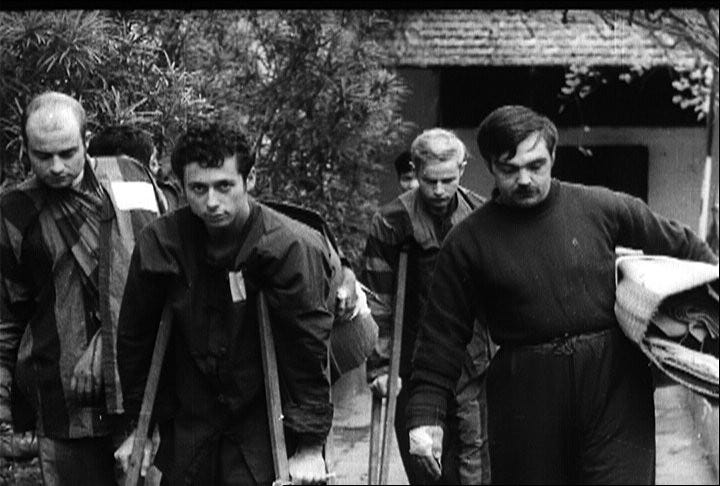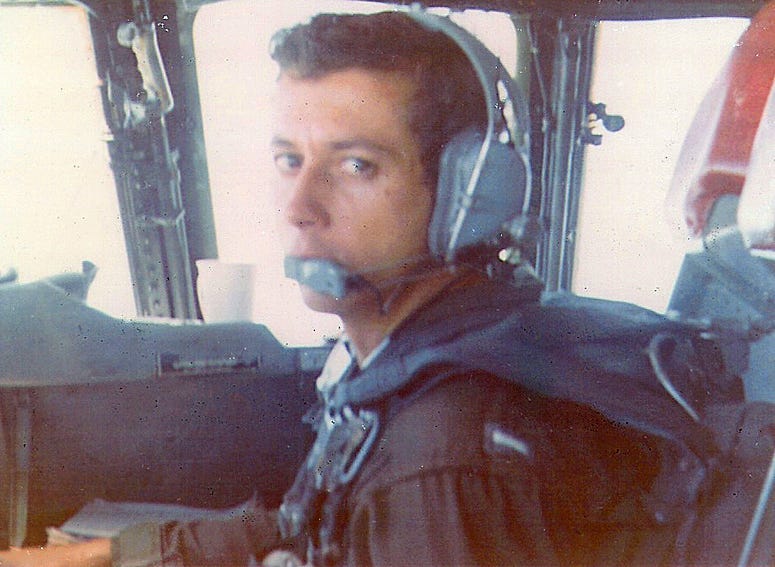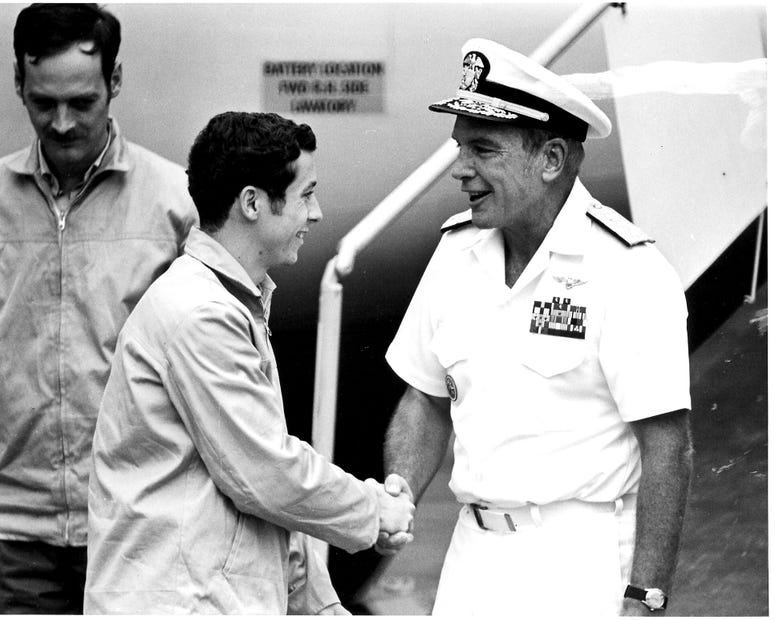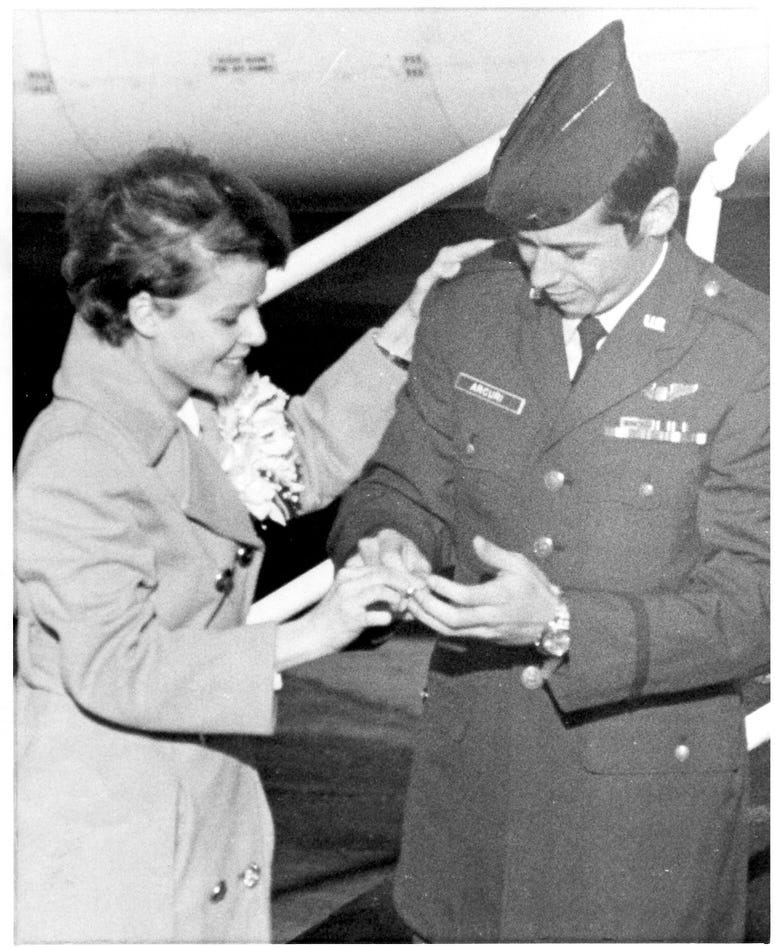
There’s an old Air Force saying that you should never bail out over an area you just bombed. But that’s exactly what happened to Bill Arcuri when he was forced to bail out of his damaged plane over Vietnam.
On Dec. 20, 1972, after successfully bombing railroad marshaling yards in Yin Vien, Vietnam, three surface air missiles hit the B-52 that he was co-piloting with a crew of six. The crew ejected strapped to their seats. Four made it out alive, and two were unaccounted for, their remains were eventually returned years later.
He landed in a bamboo field and said the stalks were about 10-12-feet tall and splintered when he landed on them. The shards stuck in his arms and penetrated his helmet.
“I was impaled by bamboo,” he said. “It was like landing on needles.”
Arcuri said one of the reasons he suffered such severe injuries was because he couldn’t control his extremities as he was plummeting to the ground at about 400-500 miles-per-hour.
“There were a couple of holes ripped in the chute,” he said. “Which is why I came down so fast.”

Arcuri and his crew were in the midst of an 11-day bombing mission, Operation Linebacker II, more commonly known as the Christmas bombings or the December Raids. President Nixon ordered the bombings in December 1972, to force the North Vietnamese back to the stalled peace negotiations.
Seriously injured, he used his radio to make one last broadcast then he smashed it. He took all the bullets out of his gun and threw them as far as he could. It was a good thing he did because angry villagers descended on him –one man took the gun, aimed it at him and pulled the trigger. An old lady also smacked him on the side of the head with a hoe. He said he was fortunate the civilian militia came and rescued him from the furious villagers.
“They fought them off with their weapons,” he said. “They saved my life.”
Arcuri said the militia then turned him over to the North Vietnamese military who took him on an arduous trip to Hanoi. At the beginning of the trip, he was blindfolded and put on a bus, where he was briefly reunited with one of his crewmembers.
He said as he boarded the bus, he looked under his blindfold and saw his pilot, who was also blindfolded. He asked him if he had seen anyone else. They were separated after that, and Arcuri was then thrown into the back of a jeep, landing on his gunner.
“We went from village to village—It’s like they were showing us off,” he said. “It was a long ride to Hanoi.”
Arcuri said they stayed in a village until the people there became unruly and then they would leave. Eventually, he and his fellow crew arrived in Hanoi and were put into Hỏa Lò prison (the name means fiery furnace), more commonly known as the infamous Hanoi Hilton.
The day after arriving at the prison, he saw his pilot from the bus. He then spent the next three to four days in solitary confinement and was interrogated. He eventually moved to another room with other injured crewmembers. Arcuri spent 55 days there and said he lost over 50 pounds.
But Arcuri is adamant that the North Vietnamese did not torture him.
“We were treated ok,” he said. “I was manhandled, but not tortured--not like the older prisoners.”
Back home in Yuba City, California, his wife of 2 ½ years, Andy Arcuri, said she was at another spouse's home when they both got the news that their husbands had been shot down on the same plane.
“It was right out a scene in a movie,” she said of the officials who showed up at the door. “There was an officer, a priest and a doctor.”
The other wife asked them if the men were dead, and Andy said she hoped Bill was, terrified that he’d be tortured to death. Everyone was shocked by her comment and tried to calm her by telling her not to lose hope.
“You saw all these stories of prisoners –in The Reader’s Digest (magazine) who had escaped and who wrote about being tortured.”
She said that the North Vietnamese would take propaganda photos of the prisoners, but her husband was so badly injured that they wouldn’t take his picture.
Arcuri said he and the younger prisoners were kept apart from the older ones who had been there for years, one of whom was the late John McCain. This was designed to keep the more senior prisoners from knowing about recent developments in the war. It was, however, the older prisoners who told Arcuri and others the end of the war was near.
“The older prisoners told us not to say or sign anything,” he said. “Because it’s over.”
A week after a peace agreement was signed, the guards told the Americans the war was over.

Dubbed "Operation Homecoming", Arcuri was in the first wave of prisoners who returned home starting in February 1973. POW’s were released based on their length of imprisonment, but due to his injuries, he and those who were also seriously injured were released along with the older prisoners.
“They put new casts on us,” he said of the North Vietnamese, “but we hadn’t been treated properly for injuries.”
Arcuri said his gunner ended up losing his leg to gangrene when he got back to the U.S.
When they were on the American C-141 planes leaving Vietnam, the crew announced they were “feet wet”, military-speak for when an aircraft is safely over land or water. “It was heartwarming seeing the reactions of the older guys--when they realized they were free.”
After they knew the prisoners were on their way home, the U.S. military prepared the families for their loved one's arrival at Travis Air Force Base in Fairfield, Calif. Andy remembers being told that they would be taken to the hospital to see them.
“I spoke up and said, ‘You can meet at the hospital, but I’m going to the flight line to meet my husband.’” She said laughing.
The top brass took a break and when they came back, they announced that each wife would have a driver to take them to the plane to greet the POW’s as they walked off the plane.
“I’m glad I said that,” she recounted saying that it was important for the American people to see.
She said that when Bill got off the plane, she wanted to put his wedding ring back on his finger, but he insisted on saluting the American flag first.
“Then he hugged me and put his ring back on.” She said. It was Valentine’s Day, 1973.

Arcuri got out of the service in 1976 and went to work for Perot Systems for the next 32 years. But it wasn’t until 20 years after his release that he finally dealt with his PTSD.
Nowadays, Arcuri is heavily involved in organizations that memorialize and honor POW’s and veterans. He also talks to young school kids about his service and has become affectionately known as “Uncle Bill”.
“I tell them my story, and I try to keep it at their level. I tell them how we passed the time,” he said. “And what it was like being a prisoner of war. What we ate; cabbage soup, bread, pumpkin, kohlrabi and pig fat.”
He also likes to tell them that he was released on Feb. 15 but arrived back home on Feb. 14, and he jokes about being a time traveler. (Hint, it was the international dateline) He laughs when he remembers some of their questions such as this one.
“Uncle Bill, how many stars were on the flag when you fought in the war?”
